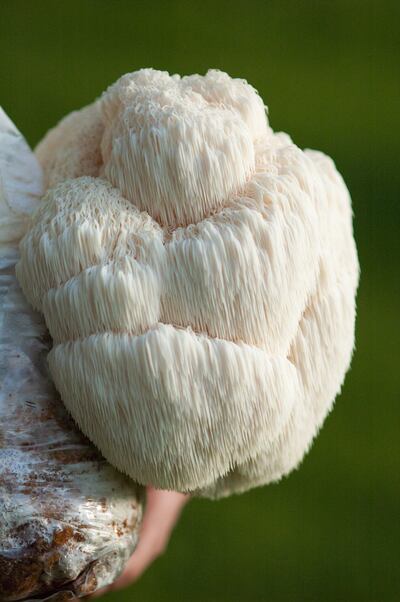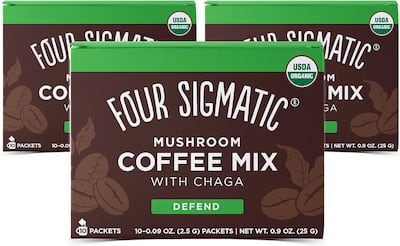From blue-green algae and olive oil, to charcoal, eggs and pumpkin, adding uncommon ingredients to a fresh cup of Joe has always caused a stir among coffee lovers. At the moment, it’s mushroom coffee that has connoisseurs bubbling with excitement, with some hailing it as the next superfood.
Some of the brouhaha over the brew, nutritionists say, can be attributed to the post-pandemic trend of seeking natural solutions for overall well-being. So, beverages such as mushroom coffee have become the go-to health drink for time-crunched working professionals. Until the next concoction flows on to the scene, at least.
“Post Covid-19, people have become mindful consumers. They are opting for foods and beverages without synthetic ingredients or artificial additives,” says health coach Urvashi Agarwal. “Mushroom coffee fits the bill for some as they feel it combines the kick of caffeine with the healthfulness of the fungus.”
What is mushroom coffee?

While the unusual beverage brings up images of bits and bobs of mushrooms floating in a cuppa, this is not the case. Mushroom coffee is a blend of the extracts of medicinal mushrooms and ground coffee beans. And these are not your regular edible mushrooms, such as shiitake, oyster, button, either, but more prized fungi such as chaga, turkey’s tail, lion’s mane, reishi and cordyceps.
Of the thousands of species of mushrooms identified so far, only a handful contain chemical compounds and nutrients that are considered medicinal, says food anthropologist Kurush Dayal. “The current popularity of mushroom coffee finds its basis in the long history of mushrooms, which have been used in Asian culinary culture as a healthy ingredient, as well as a wellness therapy for centuries,” he says.
Shiitake mushrooms have long been part of traditional Chinese medicine and is believed to help people live longer. Mushrooms are also part of the wellness traditions of Japan, South Korea and eastern Russia.
Even so, none of these countries can be credited with the invention of mushroom coffee, whose provenance can be traced to Finland during the Second World War. Amid the destruction of war and a scarcity of food items in the 1940s, Finnish people came up with the idea of using mushrooms as a substitute for coffee beans. Its popularity spread across Europe, with concoctions including mushroom cappuccinos and mushroom teas also popping up.
Health benefits of medicinal mushrooms

Nutritionist Reema Hingorani Madhian, who runs a chain of wellness clinics in New Delhi, explains medicinal mushrooms contain adaptogens, which are compounds that can help to ease stress and anxiety.
“Some of the other components contained in medicinal mushrooms include vitamins, antioxidants, terpenes and special polysaccharides called beta-glucans. This combination fortifies the human immune system and augments cognitive health,” she explains.
Apollo Hospitals
Studies have also shown that cordyceps can enhance the production of ATP, the compound that gives cells energy. Two clinical studies have found cordyceps improved exercise performance in healthy older people. Similarly, reishi mushrooms have been shown to help bolster the immune system.
Additionally, the caffeine levels of mushroom coffee tend to be lower than in instant coffee. And because mushrooms have adaptogens, they also have beneficial effects for the adrenal glands and help to mitigate caffeine’s negative effects, explains Hingorani.
Eat rather than drink

While there is anecdotal evidence for the health benefits of mushroom coffee, there is currently little scientific research. As in the case of fruit versus juice, nutritionists recommend the consumption of whole mushrooms over mushroom coffee, because the fungi are loaded with fibre. “Mushrooms are healthy, tasty, calorie-light and simple to cook. Why not consume the real McCoy instead of its coffee?” says Agarwal.
Experts also sound a note of caution before buying into the hype surrounding mushroom coffee. Consumers still need to be aware of its caffeine content, particularly as the body’s metabolism tends to slow down with age.
“Caffeine lingers in the human system for up to 10 hours and can spike the levels of the stress hormone cortisol. Therefore, it is prudent to limit caffeine intake, especially during periods of stress, aiming for one to two cups a day before lunchtime,” explains Dr Gitanjali Kochar, a senior physician at Apollo Hospitals. "Avoid mushroom or any other coffee post 4pm as it can interrupt your sleep."
Finally, if you are opting for store-bought mushroom coffee, check it is sourced from a trusted and certified seller. People should stay away from blends loaded with sweeteners or fillers, while taking only a recommended dose of 1g of mushrooms a day.

